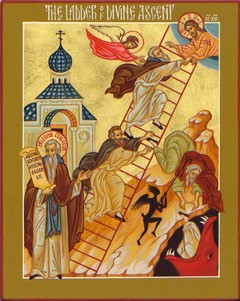 On this fourth Sunday of Great Lent, we honour St John Climacus who, in the seventh century wrote his “ Ladder of Divine Ascent”, a path of repentance with 32 steps, a parallel to the years of Christ’s life on earth, perhaps, also reflecting the path Our Lord himself journeyed along during His earthy life as he too, in human form, followed a path of perfection before He could begin His earthly ministry. If we, like St John are able to master all of these 32 steps, like him, we shall also step off the ladder (of perfection) and step into heaven, our ultimate resting place Most of us only master a few of these steps and then, as beginners, only partially. Of course, the whole book is designed as a challenge for monks; renunciation of life, detachment, exile, obedience, penitence, remembrance of death, mourning, placidity and meekness, talkativeness and silence, falsity, despondency, gluttony, chastity, avarice, and poverty, to mention but a few of the steps. But, our Lenten journey is to take stock of where we fall short, and how to make remedy and progress in the intimacy of our life in Christ. Perhaps this year, when our Lenten journey is so different, we can make progress at a different level. Without the usual support of the sacraments of the Church and church attendance, we are challenged, by our self-isolation, to focus more definitely on our solitary life of prayer; our deepening relationship with God. Hesychia to which Fr Zacharias refers (in his notes on coping with the coronavirus already circulated) is withdrawal from the world to be more close to God and to begin to value more, the prayer of silence and stillness. “Be still and know - Be still and know that I AM - Be still and know that I am God”. The Gospel for today is well chosen. A man brings his young son to Our Lord for healing. The boy suffers from epilepsy activated by a demon. The father says, “…...have compassion on us and help us” to which Jesus replied.” If you can believe, all things are possible to him which believes”. The father cries out with tears, “Lord I believe; help my unbelief”. Jesus then rebuked the spirit and the boy was healed. Later his disciples asked,” Why could not we not cast it out?” To this Jesus replied, “this kind can come out by nothing but prayer and fasting”. The lesson here is surely this; we have to have faith and believe; an unwavering faith, a certain belief. Only then can we be in a position to change things, with Our Lord there to help us. He co-operates with us when we are prepared to co-operate with him. Only when we cry, ” Lord I believe, I have faith, help thou my unbelief, my weak faith “ does he grant the answer to our prayer. Too often we plead with God to do this, do that, but we have to add our desire to co-operate with Him for this to happen. Also, we need to be in the right state of preparation. This means through prayer and fasting. Now we see that our Lenten observance is not simply optional discipline and obedience in this Holy Season, but it is a skill we have to learn so that at every moment of our life, we are in tune with God. Then all things become possible and miracles can and do happen. Through the prayers of St John Climacus may we make progress on our Ladder of Divine Ascent during this time of the Great Fast to experience a joy of Pascha as never before. Lord I believe, helps Thou my unbelief. Fr David
0 Comments
Leave a Reply. |
Parish Blog
This mainly contains homilies and messages from our priests, although there is some scope to share thoughts and interesting articles which we may want to share with others Archives
October 2022
Categories |
 RSS Feed
RSS Feed